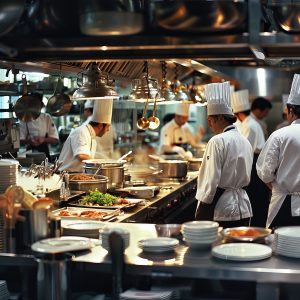Is Your Culinary School Choice Right For You?
Choosing the right culinary school is crucial in your journey to becoming a successful chef, pastry artist, or food industry professional. With so many options available, it’s essential to carefully evaluate each school to ensure it meets your educational and career goals. But how can you tell if a culinary school is outstanding?
In this post, we’ll guide you through the key factors to consider when assessing the quality of a culinary school. From accreditation and faculty expertise to hands-on training opportunities and industry connections, we’ll cover the critical elements that set-top culinary programs apart. We’ll also delve into student reviews, alum success stories, and job placement rates, all of which can provide insight into whether a school will prepare you for a thriving culinary career.
An excellent culinary school does more than teach you how to cook—it shapes your professional future by providing the skills, experience, and network needed to succeed. Whether you’re just starting your culinary education or considering a transfer, these tips will help you decide where to invest your time and money.
Note: Students should determine if their culinary school is the right one before they attend. One of the biggest errors prospective cooking school students make is not taking the time to investigate if all aspects of the culinary program are right for them.
How to Tell If A Culinary School Is Good For You?
Here are several ways to tell if a culinary school is good:
- Accreditation: Verify that the school is accredited by a recognized educational body, such as the American Culinary Federation (ACF) or other relevant accrediting organizations. Accreditation ensures that the program meets industry standards.
- Experienced Faculty: Research the instructors’ qualifications and industry experience. Top culinary schools often employ seasoned chefs, food professionals, and educators who bring real-world expertise to the classroom.
- Hands-On Training: An excellent culinary school provides ample hands-on learning opportunities, including kitchen labs, internships, and externships. The more practical experience you get, the better prepared you’ll be for the culinary industry.
- Curriculum and Specializations: Evaluate the curriculum to ensure it covers essential culinary techniques and business and management skills. Could you check if the school offers specialized programs that align with your career goals?
- Alumni Success: Look into the achievements of the school’s graduates. A strong alumni network with successful careers is often a good indicator of the program’s effectiveness.
- Job Placement Assistance: A quality school will have strong industry connections and provide support with job placement, internships, and career development services.
- Student Reviews: Read reviews and testimonials from current and former students to gain insights into their experiences with the program, faculty, and facilities.
- Facilities: Visit the campus to assess the quality of the kitchens, equipment, and resources. Top culinary schools typically have modern, well-equipped facilities that reflect current industry standards.
Question to Ask Yourself
To get the most out of your culinary college or program, give your school the following quiz (or, if you’re considering prospective culinary programs, ask current students and graduates):
Do you know if your instructors are willing and able to answer your questions?
Do you feel like you learn something new every day?
Can you see the path of your improvement?
Is your culinary program progressive (that is, does it get increasingly more difficult with each new quarter or semester)?
Are you learning about the same types of equipment you’ll use in the real working world?
Do most students who begin the culinary program see it all through?
Are your instructors and fellow students enthusiastic about your culinary job outlook?
Most days, are you excited about the things you’re learning and the people you’re meeting?
Regarding quizzes, scoring this one is pretty straightforward – “yes” answers are good, and “no” answers might indicate that your cooking school isn’t quite right for you.
That brings us to an essential point in any good culinary education: the best indicator that your culinary program will work for you is you feeling enthusiastic about it.
If you’re excited, it will show in your food and how you approach your future. While technical training skills and a big culinary school name go a long way, you are the biggest asset you have.
Is A Culinary Career Right For Me?















